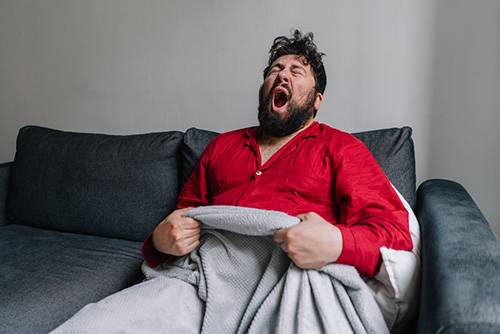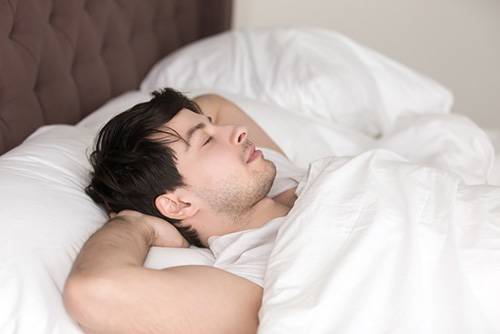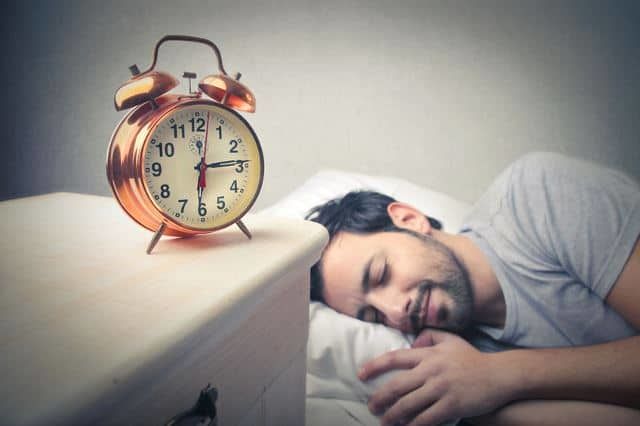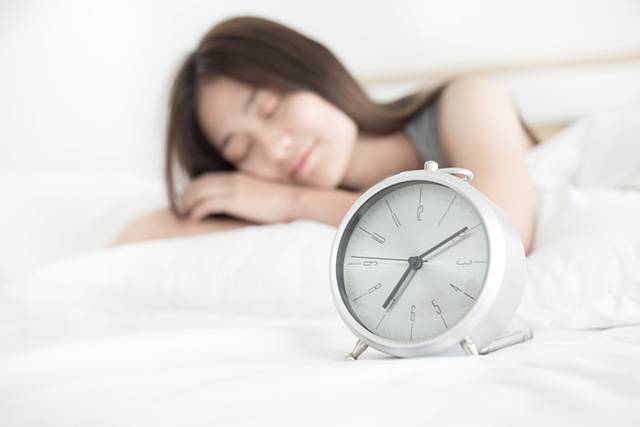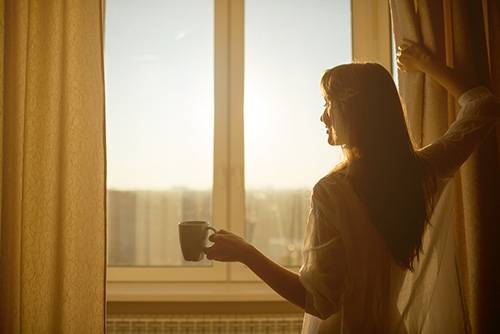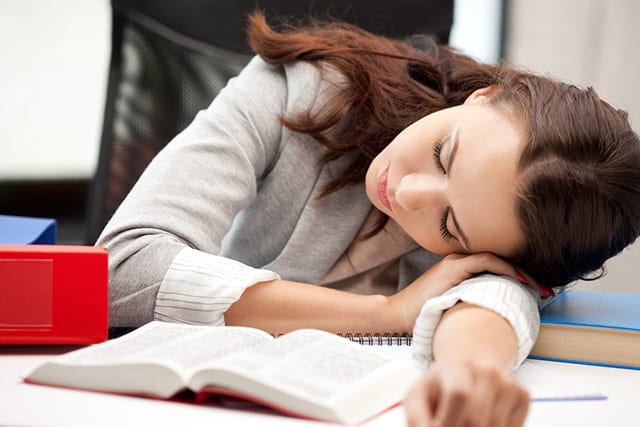Ahh…the question we’ve all been asking ourselves since, like, middle school. Except now we probably aren’t wondering about how late we can stay up surfing the Net or watching TV—we have a huge work presentation due yesterday, a decisive test in school tomorrow, or a heaping pile of insomnia. We have to be up at 7 o’clock and it’s…5:45.
What do we do?

That, friend, is our topic for the day.
First: Why do we get sleepy?
When you start to get dozy in the evening, you have your circadian rhythm and built-up sleep pressure to thank. These two factors work in conjunction with each other to 1) keep your body in a predictable pattern of sleeping and waking, and 2) ensure you feel sleepy enough each night to get some shut-eye.
The circadian rhythm is largely responsible for the production and release of hormones into your bloodstream throughout the day. When you’re exposed to light, it indicates to your body that it’s time to be awake and alert; as such, it stops the production of the sleep hormone melatonin. Once it begins getting dark, your body recognizes that it will soon be time to sleep; this is when it begins to produce melatonin in order to make you sleepy.
Sleep pressure refers to your brain’s increasing need to get sleep the longer you remain awake. Your brain requires sleep for a number of essential functions: long-term memory retention, toxin removal, forming new neural connections, and so on. The longer you’re awake, the more tired you become and the greater your brain’s need for sleep becomes.
The 4 stages of sleep
There are four different stages of sleep that your body cycles through a few times per night. Each stage of sleep is characterized by certain changes in both the body and the mind, and each stage plays an important role in keeping you healthy and sharp.
Here’s a quick breakdown for you:
Stage 1
This is a light stage of non-REM sleep that’s characterized by slower breathing and heartrate, as well as a reduction in overall brain activity.
Stage 2
This stage of non-REM sleep is characterized by even slower breathing/heartrate, slower digestion, and a lower body temperature.
Stage 3
The final stage of non-REM sleep is referred to as “deep sleep.” You breathe even slower, your blood pressure drops, and your body focuses on repairing itself. Your brain also produces slower waves.
Stage 4
This stage is also called REM (Rapid Eye Movement) sleep. REM sleep is lighter than stages 2 and 3 of sleep, and this is when most dreaming occurs.
It normally takes the body anywhere from 1.5 to 2 hours to complete a full cycle.
1 hour vs. an all-nighter
So, based on this information, is it better to sleep for only an hour or to pull an all-nighter? The answer is twofold:
- On the one hand, any sleep is better than none.
- But on the other hand, an hour of sleep is not enough time to complete a full cycle. Chances are, you would have to wake up right in the middle of deep sleep (stage 3), which would make going about your day a lot harder.
Rather, you should consider sleeping for only about 20 or 30 minutes. This way, you would experience the first couple of cycles and be able to wake up without the extra drowsiness induced by stage 3 sleep.
Another option is to aim for about 90-120 minutes of sleep. This would allow you to complete a full cycle, which is even better than completing only half a cycle.
The morning after
However, much sleep you end up getting tonight/this morning, the rest of your day will probably suck. But there are a few things you can do to keep yourself awake and get yourself ready for a good night’s sleep when it’s all over.
Drink coffee
Caffeine blocks a receptor in your brain called adenosine. This receptor would normally open the blood vessels in your brain and cause you to feel sleepy, but the caffeine’s effect on it keeps you feeling awake and alert…as awake and alert as you can be after like no sleep.
Eat well
This means focusing on consuming healthful foods and avoiding foods that are bad for you (we’re looking at you, sugar). While it’s important to make a habit of eating well every day, this is especially critical after neglecting to get enough sleep. It’s recommended to consume whole grains, protein, and B vitamins to help your body pull through the rest of the day.
Do some light outdoor exercise
Exercise causes your brain to release endorphins—chemicals that improve your mood and ward off pain—into the bloodstream. By elevating your mood, you’re making it easier for your brain to stay awake a little longer.
Getting your exercise outdoors is best, as the sunlight will let your body know it’s time to be awake. This, in turn, will help to regulate your circadian rhythm so you can be sure to get better sleep tonight.
Another note: It’s best to exercise lightly, rather than going through a full workout or aerobic session. Because you skimped on sleep, your body didn’t have time to repair muscle or rest itself from the day before. Getting intense exercise under these circumstances would tire you out, further deplete your body’s energy, and make it more difficult for your body to repair itself.
Nap (if you can)
This isn’t always an option, but taking a nap or two during the day can help to reduce the negative impact of your poor sleep. You should aim for either a couple of 20- or 30-minute naps or maybe a single 120-minute nap, which will ensure you aren’t woken up during deep sleep.
Additional notes
Sometimes all-nighters happen. Sometimes life throws the unexpected at us, and we’re stuck getting only a couple hours of sleep. It is what it is.
That said, you should always aim to get anywhere from 7 to 9 hours of sleep per night.
This is the amount of sleep the average adult needs to receive every night in order to function optimally. Failing to receive this amount of sleep every once in a while is bad enough, but doing this often can have jarring consequences for your mental and physical health: impaired learning ability, increased irritability and other negative feelings, subpar motor skills, and the list goes on.
Even just one night of skimping on sleep can impair your cognitive function, cause you to fall asleep during the day, or—perhaps most frightening—induce microsleeps throughout the day. A “microsleep” is when you become drowsy and fall asleep for a few seconds, no matter where you are or what you’re doing. This is dangerous, especially if you plan on driving or doing detailed tasks the following day.
Conclusion
To summarize:
- Sleep is the result of our circadian rhythm and sleep pressure working together to make us drowsy.
- There are four stages of sleep, each one important to our well-being.
- Some sleep is better than no sleep, but try to avoid waking up in stage 3 of your sleep cycle; 30- or 120-minute naps are ideal.
- Always make a point of getting 7-9 hours of sleep each night.
Life happens, and it’s normal to face the occasional onslaught of interruptions to our desired sleep schedule: time commitments, insomnia, big projects, you name it. If you sometimes find yourself facing the difficult choice of getting a tiny bit of sleep or none at all, you’re in good company.
We hope this article gave you the information you need to make better-informed decisions about your sleep life, but let us know in the comments if you have any additional questions or concerns on the topic.
Until next time, wishing you a great 30ish minutes of sleep.
Photo credit: LTim/Shutterstock; fizkes/Shutterstock; Akkalak Aiempradit/Shutterstock;
AlexMaster/Shutterstock; Nata Bene/Shutterstock; Sc Stockraphy/Shutterstock
